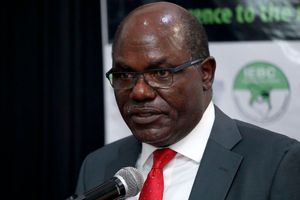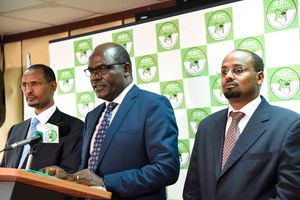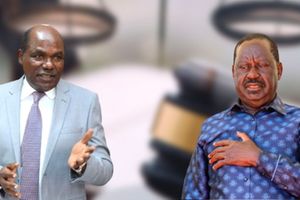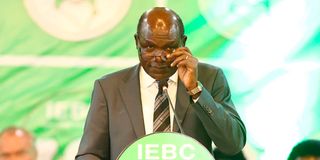
Former Independent Electoral and Boundaries Commission (IEBC) Chairman Wafula Chebukati speaks to the media at the Bomas of Kenya on August 10, 2022.
As Wafula Chebukati announced the results of the 2022 presidential race, he forlornly gazed at his audience. His balding head shone brightly, reflecting the lights overhead.
Beneath, Mr Chebukati struggled with subdued tension. The cameras clicked to capture the frazzled image. Deserted by four of his commissioners and at the Eleventh Hour, the Independent Electoral and Boundaries Commission (IEBC) chair was under intense political pressure.
He looked desolate, disturbed, perhaps stubborn, thanks to his fixed gaze. Earlier, he later claimed, somebody had punched him. But now, the fate of a nation was in his hands.
The former electoral agency boss, who passed on at Nairobi Hospital Thursday night aged 63, was always haunted by his tenure at the IEBC. Opinion on Mr Chebukati’s character and performance depends on whom you ask.
President William Ruto has described him as a “patriot”; while opposition leader Raila Odinga described him as “a person who belongs to jail”. Legal colleague, Kamotho Waiganjo, once described him as an “uninspiring disappointment.” His parents say they are “proud of him.”
The story of Mr Chebukati is a script on survival in the labyrinth of electoral politics in Kenya: rough, messy, corrupt, manipulative, and high-octane. At any step, kidnappers can snap your life, as they did to the ICT manager Chris Msando some days before the 2017 General Election.
The lawns of his Sabata Farm are well-manicured. On his X (formerly Twitter) page, he poses with the only two apostles left by his side as his tenure as IEBC chairman ended: Boya Molu and Prof Abdi Guliye. The trio were the first Commissioners to leave IEBC after the end of their term.
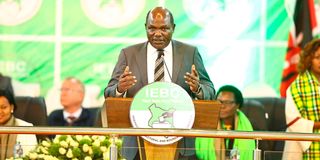
Former Independent Electoral and Boundaries Commission (IEBC) Chairman Wafula Chebukati speaks to the media at the Bomas of Kenya on August 10, 2022. File | Nation Media Group
Since the resumption of competitive multi-party elections in 1990, announcing the presidential results has always been an emotional affair, with pressure mounted on the election agency chairman.
For instance, in 1993, the late Daniel Arap Moi was hurriedly sworn in before Kenneth Matiba could file an election petition to stop the announcement of the results. In 2007, Mwai Kibaki was sworn in at dusk, after Samuel Kivuitu announced the widely disputed results that triggered the deadliest post-election violence.
For Mr Chebukati, if there was a day in his life that mattered most, August 15, 2022, offered him the ultimate challenge. Emotions were running high, and police were taking no chances. Trust from the two political camps was running low in the tightly contested race.
Some intelligence honchos were hovering around, some reportedly trying to fix the results. There was a huge crowd of local and international reporters.
Like the music band in the Titanic movie, the choir kept singing, oblivious of the ensuing drama.
The following day, he invited religious leaders to his Nairobi home for prayers and thanked them for keeping "vigil" and standing "firm at Bomas despite being injured and facing intimidation."
He wrote on his X handle: "Indeed there was Divine Intervention in protecting the will of the people."
There was a reason for that. President Ruto would later claim that in the run to the 2022 General Election, there as a plot to "assassinate" Mr Chebukati and that "The mechanism constituted a syndicate to execute a series of strategies consisting of bribery, blackmail, extortion, threats and intimidation of various public officials of the IEBC, attempt their abduction, torture and assassination, to storm the national tallying center and attempt treasonous insurrection."
At the University of Nairobi, where he graduated in 1985 with a law degree, and at Lenana High School, the former IEBC chair was known as Chebkati. But in 1997, he filed for a name change to Mr Chebukati - adding a vowel as he created a new identity, perhaps a new character.
In between, Mr Chebukati was little, known, even within the legal circles. However, he had in 2007 entered the political arena by joining Raila Odinga's Orange Democratic Movement (ODM) and vied for the Saboti parliamentary seat. But even there, he never shone at the political stage and lost to Eugene Wamalwa of Mwai Kibaki's Party of National Unity (PNU).
Mr Chebukati later claimed, during his vetting for IEBC chair, that he did not file an election petition since thugs broke into his house and stole the form 16A papers. He had been introduced, nay initiated, to the thuggish electoral politics: "I lost in 2007 because my petition documents were stolen from my house. This should never happen, and neither should the violence in the same year be witnessed," he said. With that personal experience, Mr Chebukati promised to conduct a clean, free, fair election in 2017. It was a fiasco.
Mr Chebukati came to the scene as Raila Odinga, and the opposition piled political pressure on the nine-member Ahmed Issack Hassan-led Commission to quit ahead of the 2017 elections.
Odinga said they had no confidence in the IEBC commissioners, accusing them of mismanaging the 2012 General Election he had lost to Uhuru Kenyatta. The mass protests that ensued saw Mr Hassan and his team quit, paving the way for the search for a new chairman. As pundits claimed later, the pressure on Mr Hassan and the vilification campaign saw many Kenyans shy away from the job.
As a result, the lacklustre Mr Chebukati, an uninspiring figure, bland at best, charmless at worst, was the finest on offer. As one commentator noted, "most credible candidates shied away from this top job because they knew that sooner or later their "must go" moment would arise without the need for the accusers substantiating any allegations against them."
Despite Mr Chebukati's promise of a free and fair election, there were murmurs that he was prone to manipulation since he was still a neophyte on election matters. More so, he was, a few months earlier, a life member of the ODM political party and was taking office seven months before the elections.
Today, opinion is still divided on Mr Chebukati's tenure at IEBC and whether he had the capacity to run a clean election. When Mr Chebukati took office for a six-year term in January 2017, some seven months before the General Election, there were murmurs that he was still linked to the ODM.
Kenya was going against one of the recommendations from the 2008 Kriegler Commission that the electoral body should not be changed a year to elections.
The IEBC has been mired in controversy since its establishment in 2010 to replace the Interim Independent Electoral Commission of Kenya, which was put in place after the disputed 2007 election triggered the post-election violence.
When IEBC commissioner Roselyn Akombe left her position in 2017, she said that Mr Chebukati was "under siege", meaning that he had either lost his independence or was under pressure from outsiders. Ms Akombe fled the country ahead of the presidential re-run ordered by the Supreme Court after it nullified Uhuru Kenyatta and William Ruto's Jubilee August 8 poll victory.
Akombe alleged that the repeat elections ordered by the Supreme Court "cannot meet the basic expectations of a credible election. Not when the staff is getting last-minute instructions on changes in technology and electronic transmission of results." She also said that the Mr Chebukati-led IEBC was "becoming party" to the current political crisis.
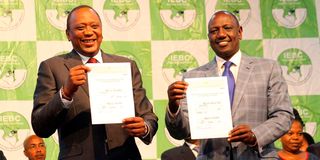
Then President-elect Uhuru Kenyatta and his deputy William Ruto display their certificates at the Bomas of Kenya on October 30, 2017 following their election victory.
Mr Chebukati conducted the elections, which the Supreme Court dismissed as full of "irregularities and illegalities," putting a major dent in his career. After Ms Akombe left, Mr Chebukati said the IEBC regretted her departure.
Under Mr Chebukati, partisan lines were created within IEBC, which was infiltrated by politicians and other non-state actors. Mr Chebukati appeared to have lost control of IEBC and was no longer in charge.
As he told the AFP news agency, after the Supreme Court annulled the 2017 election, his attempts to steady the ship were frustrated from within and without: "I've made several attempts to make critical changes, but majority of the commissioners have defeated all my motions… Under such conditions, it's difficult to guarantee a free, fair and credible election."
The dysfunctional nature of the Commission would emerge months later. On April 16, 2018, three commissioners resigned from IEBC, and according to Mr Chebukati, Vice-chairperson Connie Nkatha Maina and commissioners Margaret Mwachanya and Paul Kurgat were instigated to resign by outsiders.
He told the Senate Justice and Legal Affairs Committee that he was also receiving calls at night telling him to resign. Mr Chebukati did not name the personalities who pressured him to quit.
"I think there are some external forces who told them to resign thinking that the commission would become dysfunctional, but I want to tell them that we are going nowhere, and we will continue with our duties."
The three had resigned, citing a lack of leadership, and denounced Chebulati's failure to lead IEBC. If they thought he would budge, they were wrong. Instead, Chebukati stubbornly held on with two Commissioners: Prof Yusuf Guliye and Commissioner Molu Boya.
He then suspended the Chief Executive Officer Ezra Chiroba after controversial audits. Later, an audit report filed in Court and ordered by Mr Chebukati showed that two centres of power had mushroomed within IEBC and that there were irreconcilable turf wars - both political and commercial.
Mr Chebukati was then responding to an application by Mr Chiloba, who wanted the chairman and the remaining two Commissioners jailed for contempt of Court over his suspension. Mr Chebukati then accused the IEBC secretariat, under Mr Chiloba, of mishandling the poll. Mr Chebukati won the turf war against Mr Chiloba. After he failed to appear before a disciplinary committee set for October 2018, Chiloba was fired, and Chebukati entrenched himself within IEBC.
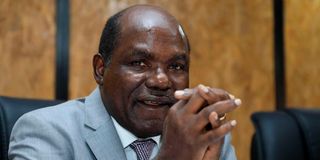
Former Independent Electoral and Boundaries Commission (IEBC) Chairman Wafula Chebukati.
In November 2021, Mr Chebukati collided openly with Chief Justice Martha Koome after she questioned the preparedness of the national poll agency in handling and delivering a free, fair and credible General Election. Mr Chebukati then termed the Chief Justice's remarks as "unfortunate, misleading, untrue and unwelcomed especially because they were made by the Chief Justice who by law is destined to preside over Presidential Election Petition(s) in any event".
The previous commissioners' resignation left Mr Chebukati as the most powerful individual at the electoral agency. More so, questions were raised whether the Commission was running without a quorum. When the Commission verified the Building Bridges Initiative (BBI) signatures, Mr Chebukati and the IEBC were taken to Court.
The IEBC emerged the biggest winner of the Supreme Court's judgment on the Building Bridges Initiative. The Court held that the Commission had quorum to verify the signatures, which also cleared the path to General Election preparations. The ruling by the Supreme Court, read by Justice Martha Koome, stated: "Although paragraph 5 of the Second Schedule of the IEBC Act fixed the quorum at five commissioners, this cannot override the Constitution. Moreover, there was a judgement of the High Court in which... it was held that the IEBC was quorate and therefore the Commission cannot be faulted."
Chekubati survived through the Executive, the Judiciary and through his machinations. It was a quorum saga triggered by the resignation of the four commissioners that led to President Kenyatta's appointment of Juliana Cherera, Francis Wanderi, Irene Masit, and Justus Nyang'aya, who were sworn in on Thursday, September 2, 2021, at the Supreme Court grounds.
This group would later be known as Cherera Four after they rejected Mr Chebukati's handling of the 2022 presidential results. Both Masit and Cherera fled to exile after the Supreme Court upheld President Ruto's victory against Raila Odinga.
That Mr Chebukati and the new Commissioners did not rhyme was obvious. They were all assigned mundane tasks within IEBC, as Mr Chebukati abrogated himself some extraordinary powers over the Commission.
The Supreme Court would later rule that Mr Chebukati, as "The chairperson, [did] not have executive, special or extraordinary powers with regard to the tallying or verification of results." It ruled that 'The mandate of tallying and verification of votes is vested in the Commission, [and] the chairperson cannot exclude any commissioners."
The judges declared Regulation 87(3) of the Elections (General) Regulations, 2012, unconstitutional.
During the 2022 election petition, the Mr Chebukati-led commission was accused of deploying a technology that did not meet the standards of integrity, verifiability, security and transparency to guarantee accurate and verifiable results.
The petitioners alleged that the Commission interfered with the uploading and transmitting of forms 34A from polling stations to the IEBC public portal. They wanted Mr Chebukati dismissed as the commission chair and barred from conducting future elections. All the allegations were dismissed by the Court, much to his joy.
During his tenure at IEBC, Chebukati always positioned himself as a victim of outside machinations. In an affidavit he filed in Court after the petition challenging the 2022 presidential results, Mr Chebukati claimed that the commission's officers were subjected to intimidation, profiling, harassment, abduction, and even killings. He said that these incidences were orchestrated to incapacitate the commission and prevent it from doing its work properly or slowing down the process.
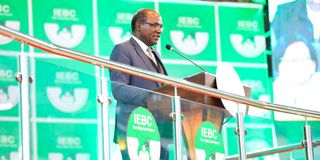
Former Independent Electoral and Boundaries Commission (IEBC) Chairman Wafula Chebukati speaks to the media at the Bomas of Kenya on August 09, 2022.
By then, Mr Chebukati must have been pondering why he walked into the Sh924,000 salary-a-month electoral circus. While the pay was good – the pressure was deadly, nay sickening. As chairman of the IEBC, Mr Chebukati enjoyed some good perks: security, a chauffeur, a diplomatic passport and first-class travel.
The pay was equivalent to that of a governor, Cabinet Secretary, Attorney General and Chief of Defence Forces, giving him a pivotal position among the State Officers. The only difference was that this was a thankless job – a punching bag position for election losers. Whether it contributed to his failing health was unknown. However, shortly after his term ended, Mr Chebukati was hospitalised.
The backstabbing, betrayal, and factions had cost him some sleepless nights. He was always wary and running frightened ever since the death of Chris Msando, the IEBC manager who was abducted and brutally murdered by unknown people.
Again, running a taintless election in Kenya, devoid of State manipulation, had become a mirage. Ahead of the 2022 elections, he had fallen out with his commissioners, and there were boardroom wars.
Mr Chebukati had been accused of trying to sneak in two Venezuelans, who were arrested at the airport with election materials. According to Irene Masit, one of the Commissioners, only Mr Chebukati knew about the Venezuelans, and the Commissioners were in the dark.
She said: "I was not aware of the coming of the foreign nationals with election materials and the same had not been brought to the attention of the commissioners either at the plenary or through any other form of communication and it was surprising as it was suspicious that the chairperson was the only person aware of their arrival."
Later, on August 17, 2022, Chebukati claimed in a Press Statement that the four estranged commissioners– Juliana Cherera, Francis Wanderi, Irene Masit, and Justus Nyang'aya – had attempted to force a presidential election run-off.
The four later claimed that Mr Chebukati announced unverified results. When former IEBC commissioners Boya Molu and Prof Abdi Guliye appeared before the tribunal probing the Cherera Four, they alleged that they were put under pressure to declare Raila Odinga as the president or force a run-off in the 2022 presidential elections.
It was a tense moment, according to William Ruto, then the presidential candidate. "We know that there was a direct attempt to abduct Wafula Mr Chebukati and murder him so that the Commission would be paralysed, or a compliant commissioner would take over and subvert the elections," alleged Dr Ruto.
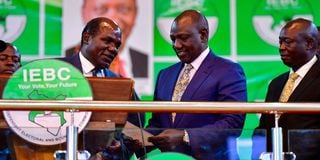
President William Ruto standing next to his deputy Rigathi Gachaua receives a certificate from Independent Electoral and Boundaries Commission (IEBC) chairman Wafula Chebukati at the Bomas of Kenya Tallying Centre in Nairobi on August 15, 2022.
Chebukati had hoped to join the judiciary and applied to become a Court of Appeal judge. He was among 82 individuals who applied to fill the 11 vacant positions. But the Judicial Service Commission did not shortlist him for the interviews – bringing to a halt his planned entry into the judiciary.
Born in December 1961, Mr Chebukati also held a master's degree. Besides his legal practice and public life, he was the ultimate family man – always praising his family for standing with him.
Shortly after he conducted his last election, he sent out a message: "I would also like to sincerely thank my lovely wife, Mary; my children Rachel, Jonathan and Emmanuel; my parents and larger family for the continuous prayers and for standing by me during the election period."
It was tumultuous. As Mr Chebukati handed a certificate of victory to Dr William Ruto, he was expressionless, stone-faced, and detached, as Ruto beamed with joy. IEBC chairmanship offered little joy. It was a painful sojourn.
[email protected] @johnkamau1

